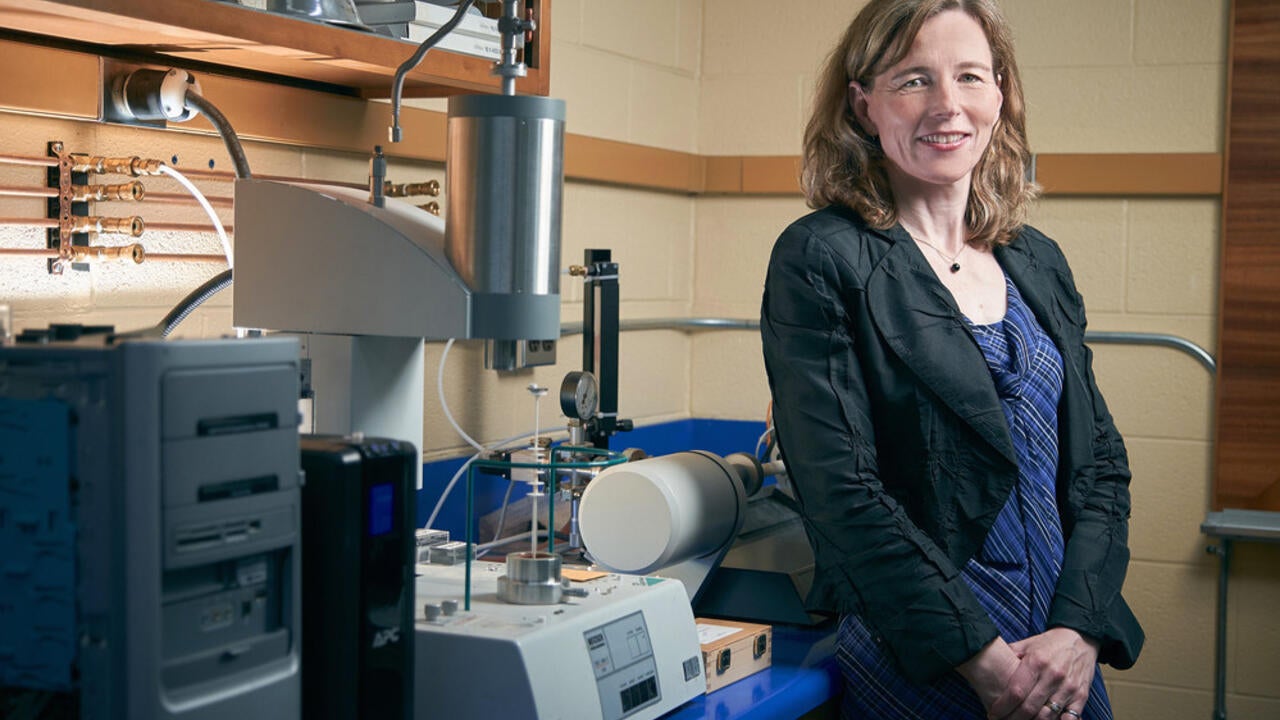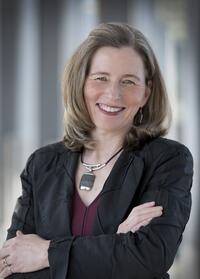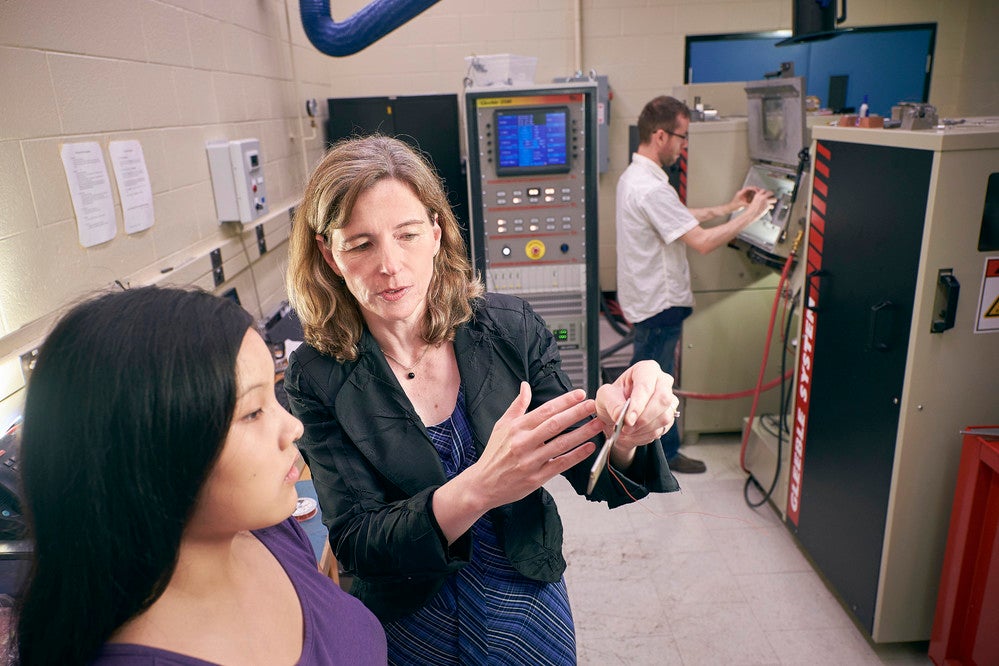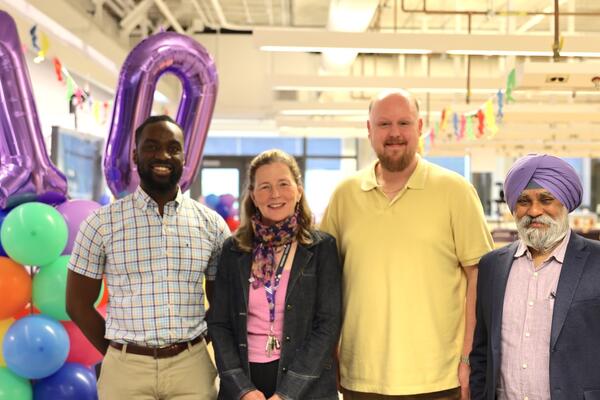
Q&A with Engineering's new dean
Mary Wells starts leading the Faculty next month

Mary Wells starts leading the Faculty next month
By Carol Truemner Faculty of EngineeringThree years after leaving Waterloo Engineering, Mary Wells will rejoin the Faculty as its dean on July 1.
The award-winning materials engineer brings a wealth of academic achievement and strategic leadership to her new post as head of the largest engineering school in Canada.
Wells currently serves as University of Guelph’s dean of the College of Engineering and Physical Sciences, a position she has held since 2017.
Before joining the University of Guelph, Wells was a faculty member in Waterloo Engineering's mechanical and mechatronics department for 10 years, beginning in 2007.
She will be Waterloo Engineering's ninth dean and the second woman to hold the post. She succeeds Pearl Sullivan, who was the first woman named to the position she held until December 31, 2019, and Rick Culham, a mechanical engineering professor, who is currently serving as interim dean.
Wells provides insight on returning to the Faculty, advancing its reputation, attracting more women to the engineering profession, challenges faced during the COVID-19 pandemic, and connecting with students remotely.
Welcome back to Waterloo Engineering!
Q: Why did you want to return to the Faculty?
A: Having been a faculty member in Waterloo Engineering for 10 years, I know how dedicated and committed the faculty and staff are to Waterloo  Engineering’s vision to cultivate future engineering leaders who are driven to both define new frontiers and improve people’s lives.
Engineering’s vision to cultivate future engineering leaders who are driven to both define new frontiers and improve people’s lives.
This passion and potential within Waterloo Engineering are what excites me the most and makes me feel energized to continue to guide Waterloo Engineering in its rich tradition of being an unconventional leader in engineering education and research.
Waterloo attracts some of the best students in Canada who want to become engineers so they can make a positive impact on the world. This makes me feel optimistic about our future as these students are driven to create a better world than the one they inherited.
Q: How do you think your past teaching and research will inform you as dean?
A: All professors have the difficult task of balancing and striving for excellence in research, teaching and service to their university. Throughout my career, I have enjoyed each of these areas immensely and at different points have had opportunities to emphasize one over the other. It is these lived experiences that will help guide me as I mentor our young professors as they start their own academic careers. These experiences also help me appreciate and understand the important role our staff plays in supporting our academic mission.
Q: You have said that you are looking forward to returning to Waterloo Engineering to build on and strengthen its strong reputation as a leader in architectural and engineering education and research. What are your initial thoughts on how the Faculty’s reputation can be advanced?
A: As engineers and architects, we design and construct new structures, processes, and products that influence how people live and how our world, including our natural environment, is transformed. The obligations and responsibilities associated with this activity are significant and require our engineering students and faculty members to critically reflect on the impact our work has on people and how they live, as well as our natural environment and resources.
I believe Waterloo Engineering has an important role to play in addressing some of the most compelling and critical issues facing Canada and Canadians today and over the next decade. Many of these are rooted in the climate crisis we face and are articulated in the UN Sustainable Development Goals. To address these “Grand Challenges”, we need to continue to ensure that Waterloo Engineering is a destination of choice for students, faculty and staff and continues with its rich history of industry and community engagement.
Waterloo Engineering Strategic Plan 2020-2025 has embedded at its core a commitment to diversity and equity throughout all programs, policies and processes, with particular emphasis on under-represented communities. At this time, where there are continuing displays of anti-Black racism and polarization among different groups of people, this core commitment is more important than ever.
In light of this, I believe it is critical that we act to understand and dismantle systemic barriers within our community that have led to disproportionate outcomes for certain groups of people compared to others. This needs to be done thoughtfully and compassionately so we can find ways to build bridges between people and enhanced understanding instead of erecting walls.
Creating a community in which all people are authentically committed to and believe in the power of diversity will lead to truly exceptional outcomes for Waterloo Engineering in both education and research.
Q: While at Waterloo, you served as the Associate Dean of Outreach for Waterloo Engineering from 2008 to 2017, chaired its Women in Engineering committee for many years, and were involved in numerous programs for girls, women, parents and teachers. You were also Chair of the Ontario Network of Women in Engineering (ONWiE) from 2013 to 2018.
What are your plans for attracting, engaging and retaining more women as Waterloo Engineering students and faculty members?
A: Diversity of people and their perspectives and viewpoints are critical to the quality and inclusiveness of the engineering work we do and also to the experience our engineering students have in their programs.
Historically, engineering has been dominated by men and this has resulted in designs and developments that are based on a male perspective. The result of this can range from mild annoyances where women are often much colder in office settings since air conditioning systems default to a higher male metabolic rate to life-threatening where vehicle crash test dummies are modelled on male anatomy. With cars built to specifications to keep a male body safe, women are 47 per cent more likely than men to be seriously injured in a car accident.
Today, despite a decade of focussed effort, women continue to be significantly under-represented in our engineering programs and we cannot take our foot off the accelerator in terms of the outreach, mentorship and pathway programs we have created to expose youth to careers in engineering.
One area I am particularly interested in is women who graduated with an engineering degree but for a variety of reasons left the profession. An idea I would like to explore is pathways to provide opportunities for these women to re-engage with the engineering profession through returnship programs.

Mary Wells meets with a student in her Waterloo Engineering lab.
Q: You are beginning your new role during the COVID-19 pandemic, an unprecedented crisis. What are the biggest challenges the Faculty faces at this time?
A: The COVID-19 pandemic has affected post-secondary institutions around the world, leading to a total physical closure of universities across Canada. Engineering education is plentiful in teamwork, labs, design and hands-on learning and these are typically difficult to offer remotely. This has caused us to think creatively about how we offer remote learning experiences to our students so they can still learn to think and act like engineers. This has created challenges but also huge opportunities for us to reimagine our engineering education system and how we can use technology to enhance what we do.
Q: Students will be learning remotely for the first six months with you at the helm of the Faculty. How do you plan to connect with them, especially those starting first year in September?
A: Part of attending University is the opportunity for students to connect with their peers and professors. Considering our students will be learning remotely, I plan to proactively find ways to connect with them so I can hear how they are doing and coping with online learning. It is especially important for our first-year students that we build a sense of community within their cohorts and Waterloo Engineering.
To help foster this connection, I plan to schedule “Tea with the Dean” (I don’t drink coffee!) over Zoom or WebEX every Thursday afternoon as a way to connect regularly with students and hear how they are doing.
Q: Last question. What are you looking forward to the most in rejoining the Faculty?
Reconnecting with the Waterloo Engineering faculty, staff and students and listening to their hopes and dreams for the future. I am also looking forward to meeting our alumni and hearing about their experiences as Waterloo Engineering students and what they felt distinguished their educational experience from other people. And since I live close to campus, I am also looking forward to riding my bike to work again!

Read more
Redefining capstone learning by bringing students, faculty and community partners together to tackle real-world challenges

Read more
Here are the people and events behind some of this year’s most compelling Waterloo stories

Read more
The Pearl Sullivan Engineering IDEAs Clinic marks a decade of delivering experiential learning embedded in the real world and mentored by industry professionals
The University of Waterloo acknowledges that much of our work takes place on the traditional territory of the Neutral, Anishinaabeg, and Haudenosaunee peoples. Our main campus is situated on the Haldimand Tract, the land granted to the Six Nations that includes six miles on each side of the Grand River. Our active work toward reconciliation takes place across our campuses through research, learning, teaching, and community building, and is co-ordinated within the Office of Indigenous Relations.